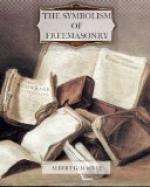And now it was among the philosophers and priests in the ancient Mysteries, or the spurious Freemasonry, that an anxiety to discover the truth led to the search for the Lost Word. These were the craftsmen who saw the fatal-blow which had been given, who knew that the Word was now lost, but were willing to go forth, manfully and patiently, to seek its restoration. And there were the craftsmen who, failing to rescue it from the grave of oblivion into which it had fallen, by any efforts of their own incomplete knowledge, fell back upon the dim traditions which had been handed down from primeval times, and through their aid found a substitute for truth in their own philosophical religions.
And hence Schmidtz, speaking of these Mysteries of the pagan world, calls them the remains of the ancient Pelasgian religion, and says that “the associations of persons for the purpose of celebrating them must therefore have been formed at the time when the overwhelming influence of the Hellenic religion began to gain the upper hand in Greece, and when persons who still entertained a reverence for the worship of former times united together, with the intention of preserving and upholding among themselves as much as possible of the religion of their forefathers.”
Applying, then, our interpretation in a general sense, the Word itself being the symbol of Divine Truth, the narrative of its loss and the search for its recovery becomes a mythical symbol of the decay and loss of the true religion among the ancient nations, at and after the dispersion on the plains of Shinar, and of the attempts of the wise men, the philosophers, and priests, to find and retain it in their secret Mysteries and initiations, which have hence been designated as the Spurious Freemasonry of Antiquity.
But I have said that there is a special, or individual, as well as a general interpretation. This compound or double symbolism, if I may so call it, is by no means unusual in Freemasonry. I have already exhibited an illustration of it in the symbolism of Solomon’s temple, where, in a general sense, the temple is viewed as a symbol of that spiritual temple formed by the aggregation of the whole order, and in which each mason is considered as a stone; and, in an individual or special sense, the same temple is considered as a type of that spiritual temple which each mason is directed to erect in his heart.
Now, in this special or individual interpretation, the Word, with its accompanying myth of a loss, a substitute, and a recovery, becomes a symbol of the personal progress of a candidate from his first initiation to the completion of his course, when he receives a full development of the Mysteries.




